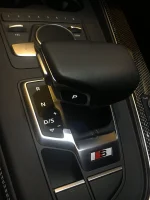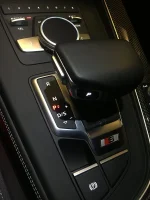devellis
Been here awhile...
- Joined
- Nov 20, 2017
- Messages
- 511
- Reaction score
- 204
- Points
- 43
- Location
- North Carolina
- Genesis Model Type
- No Genesis Yet!
But people don't devote their full attention to driving. Even good drivers encounter distractions, stressors, and other factors that lead to minor mistakes. Insurance companies' offering first-accident forgiveness is premised on the fact that someone may goof up without being a systemically dangerous driver. If one slip-up were diagnostic of the inability to drive, they'd pull your insurance after that first accident, not forgive it.
And changes that require adaptation should have a reason other than novelty. Something should be gained as a trade-off for requiring an additional adaptation.
And people don't necessarily look at their dashboard when they're dashing out of their car to get to a meeting on time.
And having to put your foot on the brake to get into reverse doesn't preclude the potential problem of then removing your foot from the brake. Ever get into an elevator when you were expecting it to go up and been momentarily fooled into thinking it was, only to realize a second later that it was moving downward? Most people have had this experience. Motion perception is pretty fluid, which is why a flight simulator is useful for training pilots and capable of convincing them that they're dropping like a rock from 30,000 feet. Expectations and other sensory cues play an important part in how we perceive apparent motion. So, is it that implausible that the load shift felt when a braked car goes into reverse might be misperceived as the load drop felt when a car goes from Drive to Park?
I agree that this isn't some sort of fundmental disaster that will send every G70 to a body shop. Most people most of the time won't be confused. But it will certainly happen occasionally. It's a potential risk (as the WHEELS.ca reviewer also noted). And it's completely unnecessary. With all of the inconvenient, safety-motivated nags in cars these days, like shutting out certain functions when the car exceeds 5 MPH, creating even a minor risk to no apparent advantage just seems really odd. Don't these companies have any human factors people on board anymore?
And changes that require adaptation should have a reason other than novelty. Something should be gained as a trade-off for requiring an additional adaptation.
And people don't necessarily look at their dashboard when they're dashing out of their car to get to a meeting on time.
And having to put your foot on the brake to get into reverse doesn't preclude the potential problem of then removing your foot from the brake. Ever get into an elevator when you were expecting it to go up and been momentarily fooled into thinking it was, only to realize a second later that it was moving downward? Most people have had this experience. Motion perception is pretty fluid, which is why a flight simulator is useful for training pilots and capable of convincing them that they're dropping like a rock from 30,000 feet. Expectations and other sensory cues play an important part in how we perceive apparent motion. So, is it that implausible that the load shift felt when a braked car goes into reverse might be misperceived as the load drop felt when a car goes from Drive to Park?
I agree that this isn't some sort of fundmental disaster that will send every G70 to a body shop. Most people most of the time won't be confused. But it will certainly happen occasionally. It's a potential risk (as the WHEELS.ca reviewer also noted). And it's completely unnecessary. With all of the inconvenient, safety-motivated nags in cars these days, like shutting out certain functions when the car exceeds 5 MPH, creating even a minor risk to no apparent advantage just seems really odd. Don't these companies have any human factors people on board anymore?











